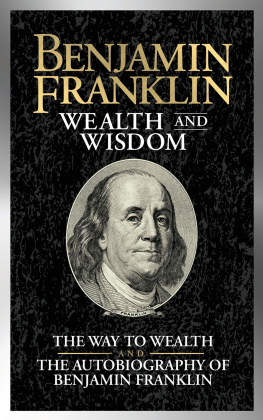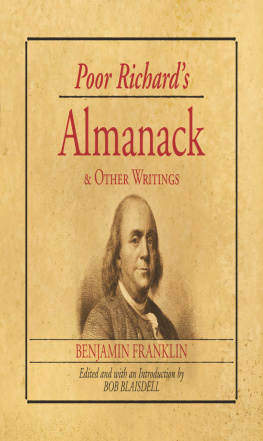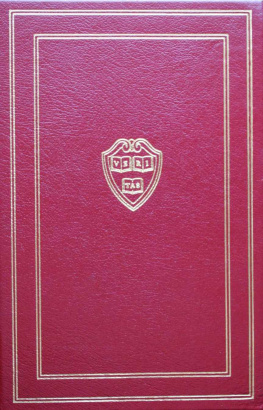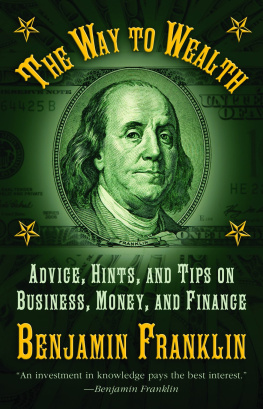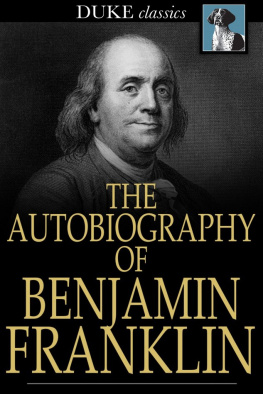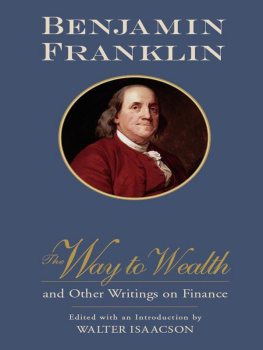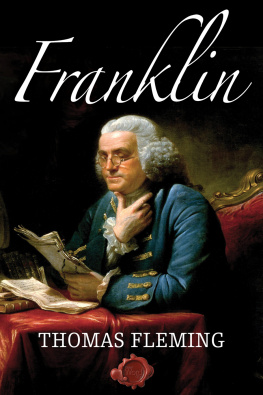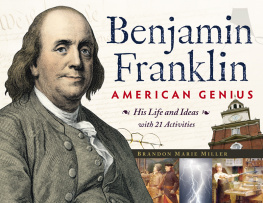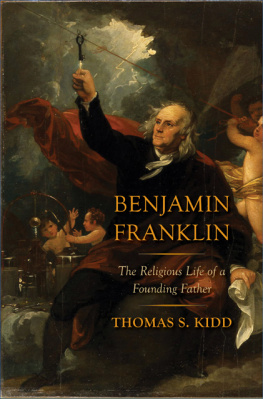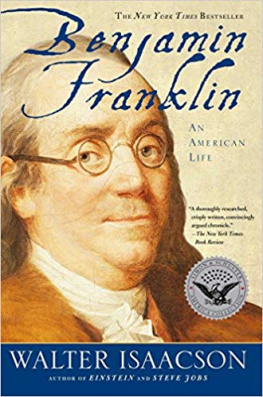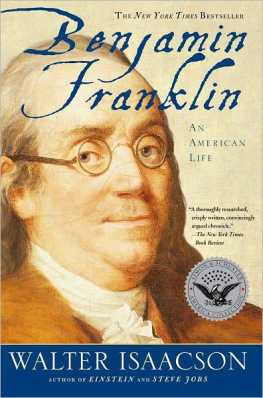Benjamin Franklin - The Autobiography and Other Writings
Here you can read online Benjamin Franklin - The Autobiography and Other Writings full text of the book (entire story) in english for free. Download pdf and epub, get meaning, cover and reviews about this ebook. year: 1986, publisher: Penguin, genre: Detective and thriller. Description of the work, (preface) as well as reviews are available. Best literature library LitArk.com created for fans of good reading and offers a wide selection of genres:
Romance novel
Science fiction
Adventure
Detective
Science
History
Home and family
Prose
Art
Politics
Computer
Non-fiction
Religion
Business
Children
Humor
Choose a favorite category and find really read worthwhile books. Enjoy immersion in the world of imagination, feel the emotions of the characters or learn something new for yourself, make an fascinating discovery.

- Book:The Autobiography and Other Writings
- Author:
- Publisher:Penguin
- Genre:
- Year:1986
- Rating:3 / 5
- Favourites:Add to favourites
- Your mark:
- 60
- 1
- 2
- 3
- 4
- 5
The Autobiography and Other Writings: summary, description and annotation
We offer to read an annotation, description, summary or preface (depends on what the author of the book "The Autobiography and Other Writings" wrote himself). If you haven't found the necessary information about the book — write in the comments, we will try to find it.
The Autobiography and Other Writings — read online for free the complete book (whole text) full work
Below is the text of the book, divided by pages. System saving the place of the last page read, allows you to conveniently read the book "The Autobiography and Other Writings" online for free, without having to search again every time where you left off. Put a bookmark, and you can go to the page where you finished reading at any time.
Font size:
Interval:
Bookmark:
PENGUIN CLASSICS
BEN FRANKLIN
THE AUTOBIOGRAPHY
AND OTHER WRITINGS
The youngest of ten sons of a Boston soap and candle maker, Benjamin Franklin (1706-1790) had little formal schooling, and was trained in adolescence as a printers apprentice. At seventeen he ran away to Philadelphia, where as an industrious tradesman, printer, and journalist he earned enough to virtually retire from business in his early forties. As a delegate to the Second Continental Congress, Franklin helped prepare the Declaration of Independence. His rise to wealth from humble beginnings and his momentous political and diplomatic roles were enough to ensure his fame. But he also won international renown for his Franklin stove and other inventions, his experiments with electricity, his civic improvements, his philanthropic schemes, his sagacity and wit, and his penetratingly lucid prose. Although a representative of Enlightenment cosmopolitanism a citizen of the world Benjamin Franklin has also become a symbol of American civilization.
Kenneth Silverman is professor of English at New York University, a fellow of the American Antiquarian Society, and a council member of the Institute for Early American History and Culture. His books and editions include Colonial American Poetry (1968), Timothy Dwight (1969), Selected Letters of Cotton Mather (1971), A Cultural History of the American Revolution (1976), and The Life and Times of Cotton Mather (1984), which won a 1984 Bancroft Prize in American History and a 1985 Pulitzer Prize for Biography.
B ENJAMIN F RANKLIN
Edited and with an Introduction by
K ENNETH S ILVERMAN
.png)
T he Autobiography of Benjamin Franklin is one of the most famous books ever written, by one of the most famous men who ever lived. Its author began life as one of seventeen children of a Boston candlemaker and had scarcely two years of formal schooling, but was eventually received by five kings and awarded honorary degrees by six universities. In his time, an Italian academy hailed him as the greatest Philosopher of the Century. The French honored him with a craze, stamping his portrait on so many prints, plates, snuffboxes, and medallions that in Paris his face became, he said, as well known as that of the moon. And Americans for two centuries have endowed with his name their schools, their streets, their counties, their banks, and their children.
Franklin gained his worldwide esteem for achievements not only individually impressive but also so numerous that accounts of them traditionally take the form of catalogs. His lucrative business career as a Philadelphia printer and tradesman enabled him to retire at the age of forty-two, but he also acted as alderman, councilman, burgess, and justice of the peace, and helped to found many of the citys main public institutions, including its watch, fire company, militia, college, and hospital. His experiments with electricity transformed existing, miscellaneous knowledge about the subject into a coherent discipline, but his scientific speculations also Couched on yellow fever, cancer, the origin of springs, astronomy, the formation of raindrops, hot-air balloons, the Gulf Stream, magnetism, sleep, surface tension, demography, and heat: absorption. One of his celebrated lightning rods was set on St. Marks basilica in Venice by 1777, but he also invented a simplified clock, a tool for retrieving books from high shelves, a machine for duplicating handwritten documents, the Franklin stove, and the Armonica, a warbly-sounding instrument for which music was composed by Mozart.
And of course much more. Franklin wrote at length or in passing on agriculture, chess, military strategy, literary style, silkworms, pickled sturgeon, ice boats, mastodon teeth, garters, and the balance of trade. He drew an influential political cartoon. He may have written a string quartet. He became postmaster general. He considered opening a swimming school.
Franklins fame has depended not only on his achievements but also on his personality and character. His geniality and wit made others long for his company. And to his more than fifty years of public service crowned by his part in writing the Declaration of Independence, his role as American minister plenipotentiary to France, and his attendance at the convention that devised the Constitution of the United States he brought a sensitive understanding of human nature and a realistic view of the possibilities for human happiness, together with enormous self-confidence, shrewdness, and tact. Gifted with foresight indeed a kind of seer he made remarkably few bad decisions, although often faced with momentous choices.
The Autobiography and American Ideals
The Autobiography does not record this legendary existence fully. It is a short, quiet book, written in a neoclassical version of the Puritan plain style, without formal beauty or pretensions to emotional force. Franklin completed the first section in England in 1771, when he was sixty-five, the second in France some thirteen years later, the third in Philadelphia four years after that. When he began the fourth (and last) section, also in Philadelphia, he was eighty-four years old and tormented with the stone, his appetite and digestion so much destroyed by the opium he took to subdue his pain that little remains of me, he wrote, but a Skeleton covered with a Skin. Never completed, his book breaks off before the time of the American Revolution, previous, that is, to his major political feats. Given also his customary pose of authorial modesty, readers may find his self-portrait muted and lacking in glamour. But even when he began the book, knowledge of his accomplishments was so widespread that he could take it for granted. He therefore wrote from the point of view of his own legend. He would show his readers how he became what he knew he had in their minds become.
The Autobiography owes much of its vast fame to the fact that in tracing his development Franklin gave classic expression to three powerful ingredients of the American Dream: the ideals of material success, of moral regeneration, and of social progress. Even those who have never read the book know something of Franklins account of his rise to riches, of how he acquired habits of, and a reputation for, moderation, industry, and probity. Fascinated by the shaping power of biology and nurture, he implies that he inherited these virtues from his family of English Dissenters. For example, he relates that his father, Josiah, discoursed so entertainingly at dinner that he paid little attention to his food, giving rise to a lifelong habit of temperance. During his first voyage to England he supped on half an anchovy on a very little Strip of Bread & Butter. Shunning alcohol whose ruinous effects on others lives the Autobiography repeatedly illustrates and strengthening his arms by swimming, he gained physical and mental vitality, which fostered his related habit of industry. He not only worked hard but also arranged to be noticed doing so, sometimes buying printing paper and then conspicuously pushing it home in a wheelbarrow through the streets. He also established when young and then zealously guarded a reputation for honesty and good sense.
It is of course a familiar account, which reverberates throughout American history in such real careers as Andrew Carnegies and such fictional ones as Horatio Algers. Less familiar is the fact that Franklin also attributes his business success to his love of reading and writing. Arrived in Philadelphia, he befriended other young Lovers of Reading the books most recurrent category for classifying human beings and formed them into the Junto, a literary club that also provided business contacts. Having trained himself, remarkably, to write effectively as a child, he later won the attention of rich and important men by his writing ability, which together with his careful printing brought new business. In sum, by early middle age he had despite his humble origins secured a fortune substantial enough to afford him Leisure during the rest of my Life, for Philosophical Studies and Amusements.
Font size:
Interval:
Bookmark:
Similar books «The Autobiography and Other Writings»
Look at similar books to The Autobiography and Other Writings. We have selected literature similar in name and meaning in the hope of providing readers with more options to find new, interesting, not yet read works.
Discussion, reviews of the book The Autobiography and Other Writings and just readers' own opinions. Leave your comments, write what you think about the work, its meaning or the main characters. Specify what exactly you liked and what you didn't like, and why you think so.

